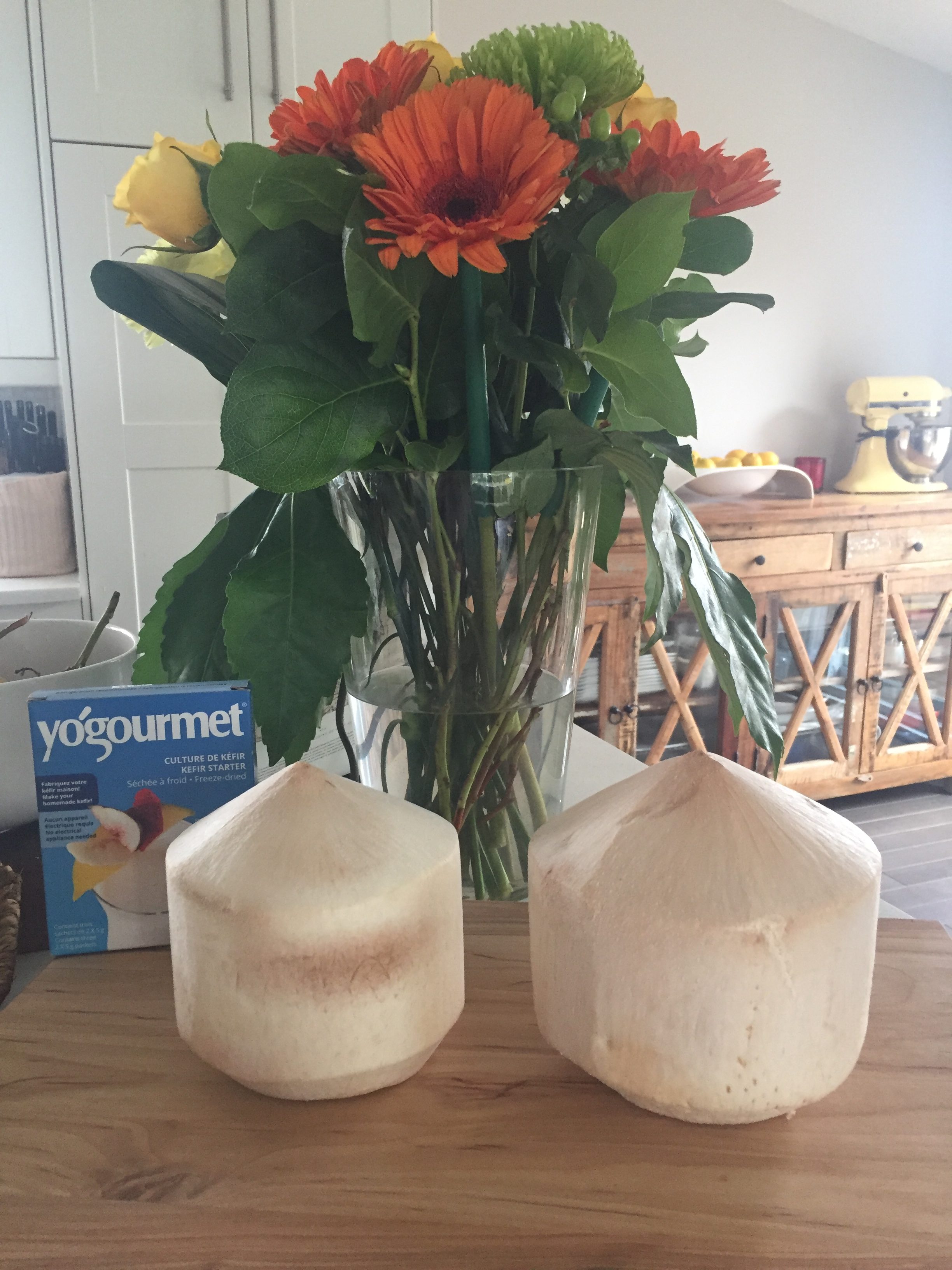Coconut water is the liquid found in coconut. We often mistakenly confuses this product with the coconut milk which comes from a mixture of coconut water and pulp. In addition to being tasty, coconut water has some very interesting properties. This water, which is filtered directly from the earth, naturally contains electrolytes. It is hydrating, alkalinizing, isotonic and rich in minerals. It is often nicknamed the natural “Gatorade”!
Did you know that coconut is actually the seed of the coconut (palm tree). This seed is very tough and it can travel very long distance. It can even float on the water and cross an entire ocean to end up on some other shore to plant its seed. The water inside is made of fresh steril water that will help nourish the germ of the coconut tree. In Sanskrit, coconuts are called “kalpa vriksha” which means “tree that gives all that is necessary to live”
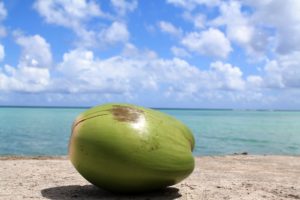 – 93.5% water
– 93.5% water
– 2 to 3.91% glucose
– vitamins from the B & C group
– some mineral salts (calcium, iron, manganese, magnesium, phosphorus, selenium, sulfur, zinc) but significant quantities of potassium and sodium.
Potassium: 250 ml of coconut water alone contain 600-700 mg of potassium, which represents one-third of the recommended daily intake (RDA). Potassium is anti-acid, promotes recovery after exercise, avoids muscle cramps and contributes to bone health with its calcium and magnesium acolytes. Potassium neutralizes the effect of sodium in the body, helping to reduce blood pressure.
Did you know that the term isotonic drink means that the concentration of electrolytes is close to that of the blood, so that the drink restores as soon as possible the imbalances following exertion (dehydration, mineral losses, blood glucose …)
Did you also know that during the 1941-1945 Pacific War, the two parties in conflict regularly used coconut water, pressed directly from the hull, to make emergency plasma transfusions to the wounded soldiers. Read more … FAO sources
Why Kefir?
Kefir is extremely easy to make and will convert sugar that is found in coconut water into an excellent source of probiotics. These bacteria promote bowel health and aid in the fragile equilibrium of the intestinal microflora. In addition, kefir is a formidable tool to fight candida albican.
Recipe for Coco Water Kefir:
- 2 young coconut. If you are not able to find fresh coconuts, you can also use canned coconut water. Use absolutely unpasteurized water if not it will not ferment. Vita coco is a good choice. You will need about 1 liter.
- 1 sachet of Kefir Starter
- 1 Glass jar to keep coconut water kefir
- 1 sieve
Instructions:
Open the top of your coconut so you can remove the precious water inside
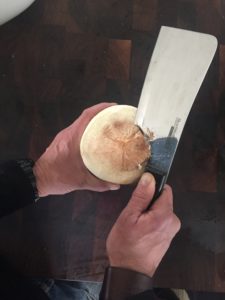
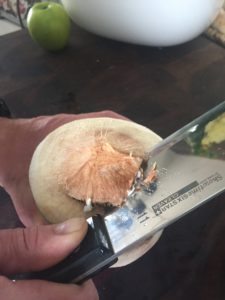

Be very careful and pay attention to your fingers. Make 3-4 knife strokes on top of the nut by turning it lightly each time. I use a machete knife, but a chef knife could easily do the trick.
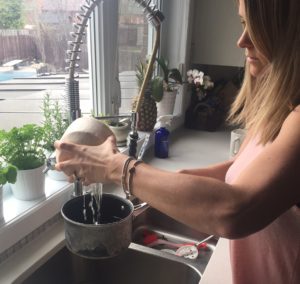
Empty coconut water into a cauldron
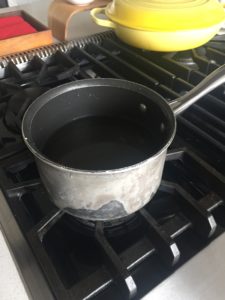
If the water is cold, heat at very low temperature, about 1 minute, to bring the coconut water to a temperature of about 31-32 degrees Celsius or 92 F.
The water should not boil, only be tempered otherwise it will kill the bacteria when you add the kefir starter and it will not ferment. If you insert a finger, you should not feel heat or cold.
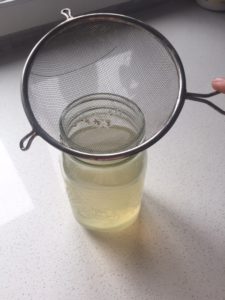
Pour the kefir into a glass container, use a sieve to remove any traces of nuts, seeds or fibers.
Do not keep in a plastic container. Please, stop using plastic to keep your food. Plastic contains forms of xenoestrogen which are harmful to your health. Plus, it’s not good for the environnent. Use a mason jar or just reuse the glasses containers from your jams, tomato sauce, etc …
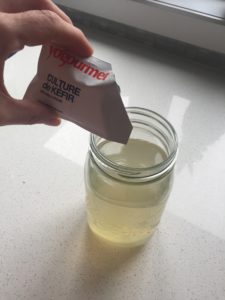
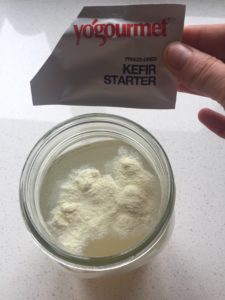
Add activating powder to Kefir
You can easily find them in natural health stores or online: http://www.yogourmet.com/ca-en/kefir-starter-culture
I love Donna Gates’ kefir culture. It contains a little more bacterial culture: http://bodyecology.com/digestive-health-kefir-starter.html#sns_tab_products2
If you are not able to get some Kefir starter, you can take 4-5 probiotic capsules, open them and pour the powder inside of the coconut water. Make sure your probiotics contain acidophilus and bifidus.
Stir it up with a wooden spoon, this will awaken our bacteria friends.
Let the party begin!
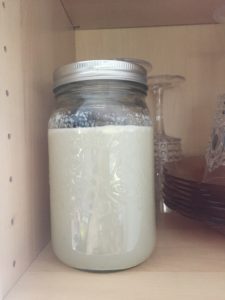
Next, store the mixture in a cabinet for 24 to 36 hours. Make sure that the resting place is not too cold. The ideal temperature should be around 21-22 degrees Celsius (70-75 F). This will promote better fermentation. This process will alter the taste of coconut water and the final taste will be tart/sour. When ready, your coconut kefir will have a cloudy appearance. It is now time to transfer your kefir water to the refrigerator. The fridge will stop the fermentation process.
Your healthful, refreshing and sparkling beverage will last about 1 to 2 weeks.
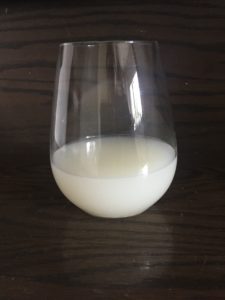
There will be no more sugar at the end of the fermentation process. The bacteria will have converted all the sugar into probiotics necessary for health. These probiotics, when ingested, will do the same things in your body! Isn’t it great? Thus, the water of kefir is an excellent beverage to privilege when one is struggling with a problem of candida.
When you start drinking fermented products, start slowly but regularly. Start with a small dose after each meal. You may feel an early discomfort (stomach aches), but as you are getting more use to it, you can increase the dose.
You can use it as a base for your morning “smooties”. Give it a flavor, add celery, cucumber, tomatoes, lime, etc. … ..
Health benefit Coconut Kefir:
Promotes healthy digestive system:
- Facilitates digestion of meals (after)
- Cleans, tones and detoxifies intestines
- Reduces flatulence and bloating
- Contribution of beneficial bacteria and yeasts to intestinal microbiota
- Helps control sugar cravings
- Beneficial for the health of the liver
Promotes the elimination and metabolism of toxins
- Can help reduce joint pain
- Supports Endocrine System
Supports and has a positive effect on the health of the endocrine system
- Support for the regularity of women’s mens periods
- Reversing Early Menopauses
Supports heart health
- A study published in 2012 “Medicinal Food Journal” found that coconut water (young and mature) had a positive impact on lipid metabolism, and it could inhibit the increase in total cholesterol. That is to say LDL, triglycerides and low density lipoproteins (VLDL).
Thanks to the cytokines found in this water, the latter can have anti-age properties very interesting for the cells and the tissues.
What should you do with the flesh?
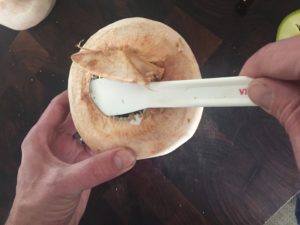
Remove the coconut meat with a spatula. “I love my vitamix spatula to do this task.” Scrape round the coconut with your spatula to make the flesh take off.
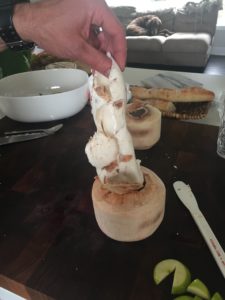
Then you just have to remove it slowly. You can use this flesh for your “smooties”, to make coconut milk, to eat like that. It is delicious!
What if your coconut is pink?
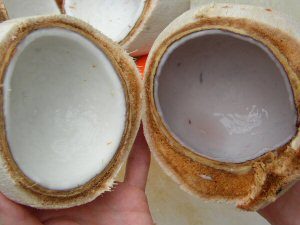
The flesh of your cocoa should be white. If it is greyish, do not use and discard water and pulp.
However if the flesh is pink, this does not mean that the coconut is not good. The pink in coconut water or in the pulp is not dangerous and it does not mean that the coconut is contaminated. This is caused by the antioxidant activity of the phenolic compounds naturally present in the coconut. These phenolic compounds sometimes react with certain enzymes present in the coconut and transform the water and the flesh of it into a pink color. This can also be caused by contact with oxygen. It is a natural oxidation process.
In any case, always use your common sense. If the smell is suspicious, do not use and discard the coconut and its juice.
I hope you enjoyed this post
Have a wonderful healthy day! Lets drink to that!
Isabelle Votre Amie Essentielle
Références:
https://www.plantes-et-sante.fr/decouvrir/l-eau-de-coco-isotonique-et-alcalinisante
http://www.phytomania.com/cocotier.htm
https://www.exoticsuperfoods.com/pages/sample-page
http://thesesante.ups-tlse.fr/1635/1/2016TOU32103.pdf
Isabelle Votre Amie Essentielle

